15 Things You Might Not Know About Chinese New Year
Chinese New Year is also called Chinese Lunar New Year or the Spring Festival.
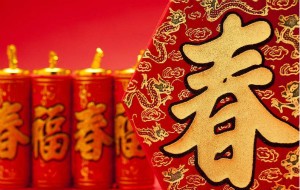
Chinese New Year is also called Chinese Lunar New Year because it goes according to the lunar calendar. Chinese New Year means the beginning of a new year. The first day of the first Chinese lunar month serves as the beginning of the year.
Though Chinese New Year falls in winter season, the Chinese people call it Spring Festival (春节 in Chinese). New Year is often associated with spring. This is because in ancient times, Chinese people arranged production according to the 24 solar terms and used to regard spring as the beginning of a year. As the Chinese proverb goes, "the whole year's work depends on a good start in spring." It shows that spring is of great significance to people, because it is not only the start of a new year, but also a good beginning for everyone.
Chinese New Year holiday is the longest Chinese holiday starting from lunar Dec. 23 to Jan. 15.
Spring Festival refers to the Lunar New Year, which already has a history of more than 4000 years in China. In modern times, Spring Festival falls on the first day of the first lunar month but usually lasts to the 15th day of the month. In folk China, the traditional Chinese New Year lasts from the Laba Festival (the 12th day of the 12th lunar month) or the Little New Year (the 23rd day of the 12th lunar month) to Lantern Festival (the 15th day of the first lunar month). Among the days, the New Year's Eve, New Year's Day and Lantern Festival are the climax.
Chinese New Year's date is no set.
Generally, Chinese New Year's Day (the first day of the first Chinese lunar month) falls on different days in Gregorian calendar. It usually falls upon one day between January 21 and February 21 according to the Gregorian calendar. 2024 New Year falls on Feb.10. The earliest Spring Festival (January 21, 1966) differs by a whole month from the latest (February 20, 1985). The Chinese New Year's Day on February 21 in 2319 will be the latest in history.
Every Chinese New Year starts a new animal's zodiac year.
 In China, there are 12 zodiac animals. Every year is named by an animal. Every Chinese New Year starts a new animal’s zodiac year. For example, 2025 is the year of Snake. The Snake year starts from the Chinese New year Jan.29 in 2025. 2026 is the year of Horse. The Horse year starts from the Chinese new year day Feb.17th in 2026 in Gregorian Calendar.
In China, there are 12 zodiac animals. Every year is named by an animal. Every Chinese New Year starts a new animal’s zodiac year. For example, 2025 is the year of Snake. The Snake year starts from the Chinese New year Jan.29 in 2025. 2026 is the year of Horse. The Horse year starts from the Chinese new year day Feb.17th in 2026 in Gregorian Calendar.Chinese New Year is the biggest celebration on earth.
At least one-fifth of people celebrate the Chinese New Year. Apart from overseas Chinatowns, some countries and nations in the cultural cycle of Chinese characters, under the influence of Chinese culture, also celebrate the Chinese New Year. Asian countries (South Korea, North Korea, Japan, Vietnam, Thailand, Singapore, Indonesia and Malaysia), as well as overseas Chinese and local people around them in other countries, also celebrate the Spring Festival.
Billions of red envelopes are given to Children during the New Year.
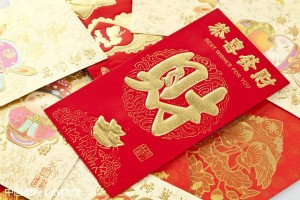
Chinese New Year food have special meanings.
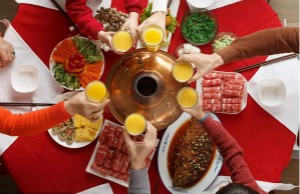
The food in Chinese New Year is very special and people believe the traditional food can bring them and their family good luck. Many foods have auspicious meanings. For example, dumplings are similar with shoe-shaped gold ingot, and eating dumplings during the Spring Festival has the auspicious meaning of making money; fish is homophonic with surplus in Chinese language, and it symbolizes more luck, happiness, and surplus year after year. In South China, rice cake is popular, which means getting better and better (cake is homophonic with high) and symbolizes higher harvest and state than last year; Hot Pot represents prosperous life.
The Chinese like to decorate everything red for the New Year.

World's largest firework set off during New Year celebrations
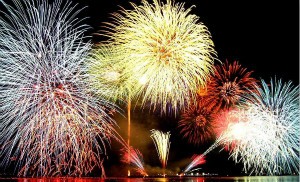
CCTV's Spring Festival Gala on New Year's Eve is the world's most-watched television show.
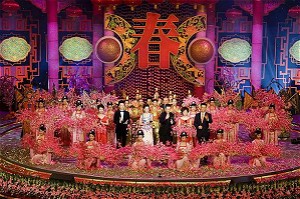
The Spring Festival causes the largest human migration in the world.
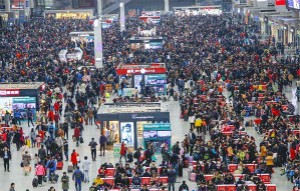
Everyone grows one year older after the Chinese Spring Festival.
Generally speaking, people gets one year older after the birthday, which is called ''round age''. But in Chinese culture, Spring Festival is regarded as the boundary of two ages, and people gets one year older after the Spring Festival, which is called ''virtual age''.
Spending Chinese New Year is a headache for old singles!
Every Chinese New Year, the overage single youth would find it a headache to go home, because everyone would make detailed inquiries and urge them to get married. Therefore, they fear of coming home for Spring Festival, and some even take the initiative to work during the festival rather than go home. Some people even rent a temporary partner to go home for the festival, so as to avoid various inquiries and being forced to marriage.
Consumer's spending during the Chinese New Year promotes economic growth greatly.
Chinese New Year is an ancient Chinese festival with rich cultural connotations and vitality, also a holiday which can best drive social consumption and promote economic growth. It epitomizes the annual consumption of Chinese people. During the festival, the mass flow of people, finance, materials, information and art promotes the overall prosperity of culture, commerce, transportation, tourism, telecom, finance, catering and other industries, forming the unique Spring Festival economy.
More and more people travel during the Chinese New Year
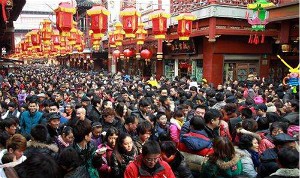
For Chinese people, Spring Festival is very important, and they would go home to reunite with their families no matter how difficult it is. At the same time, more and more Chinese people go on a tour during the festival. Blue-and-white collar workers, with high pressure from work and rapid pace of life, have quite limited holidays and want to relax in the rare 7-day holiday, so they choose to go on a tour during the festival, which has been a trend and even shows the living standard of a family. Chinese people have gotten used to the way and many people would go on a tour with their family or friends. As a result, many tourist attractions are extremely crowded during the Chinese New Year.
Chinese Calendar
| Su | Mo | Tu | We | Th | Fr | Sa |
|---|---|---|---|---|---|---|
| 1十四/14 | 2十五/15 | 3十六/16 | 4十七/17 | 5十八/18 | 6十九/19 | 7二十/20 |
| 8廿壹/21 | 9廿二/22 | 10廿三/23 | 11廿四/24 | 12廿五/25 | 13廿六/26 | 14廿七/27 |
| 15廿八/28 | 16廿九/29 | 正月 (Jan) 17初壹/1 | 18初二/2 | 19初三/3 | 20初四/4 | 21初五/5 |
| 22初六/6 | 23初七/7 | 24初八/8 | 25初九/9 | 26初十/10 | 27十壹/11 | 28十二/12 |
{{week}}. {{month}} {{day}}, {{year}}
Lunar Date
{{lmonth}} {{lday}}, {{syear}} ({{zodiac}}) Year ({{lyear}}){{sday}} Day, {{smonth}} Month
Clash {{clash}} | Evil {{evil}}
Auspicious
-
{{#luckly}}
- {{.}} {{/luckly}}
Inauspicious
-
{{#unluckly}}
- {{.}} {{/unluckly}}
Auspicious Times
-
{{#luckyTime}}
- {{.}} {{/luckyTime}}
